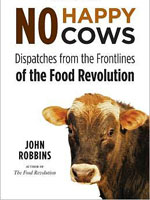The Farm Bill Should Help the Planet, Not Just Crops (New York Times)

In a New York Times op-ed, Mark Hertsgaard points out the climate disaster lurking in the pending farm bill: The Farm Bill Should Help the Planet, Not Just Crops
The proposed farm bill — Senate- or House-style, take your pick — would make American agriculture’s climate problem worse, in two ways. Not only would the bill accelerate global warming by encouraging more greenhouse gas emissions, it would make the nation’s farms more vulnerable to the impacts of those emissions.
...
Both of the farm bill proposals would maintain agriculture’s large climate footprint, mainly by continuing to skew subsidies toward a mere handful of commodity crops....
...
Farmers can best boost resilience to climate change, scientists say, by improving their soil’s fertility and capacity to retain moisture. That means cutting back on chemical fertilizers, which kill many of the microorganisms that ventilate soil, and shifting to compost and manure fertilizers and crop rotations.
Instead, leading lobbyists for agribusiness want to retain the current production system but shift the mounting climate risks to the taxpayer....

